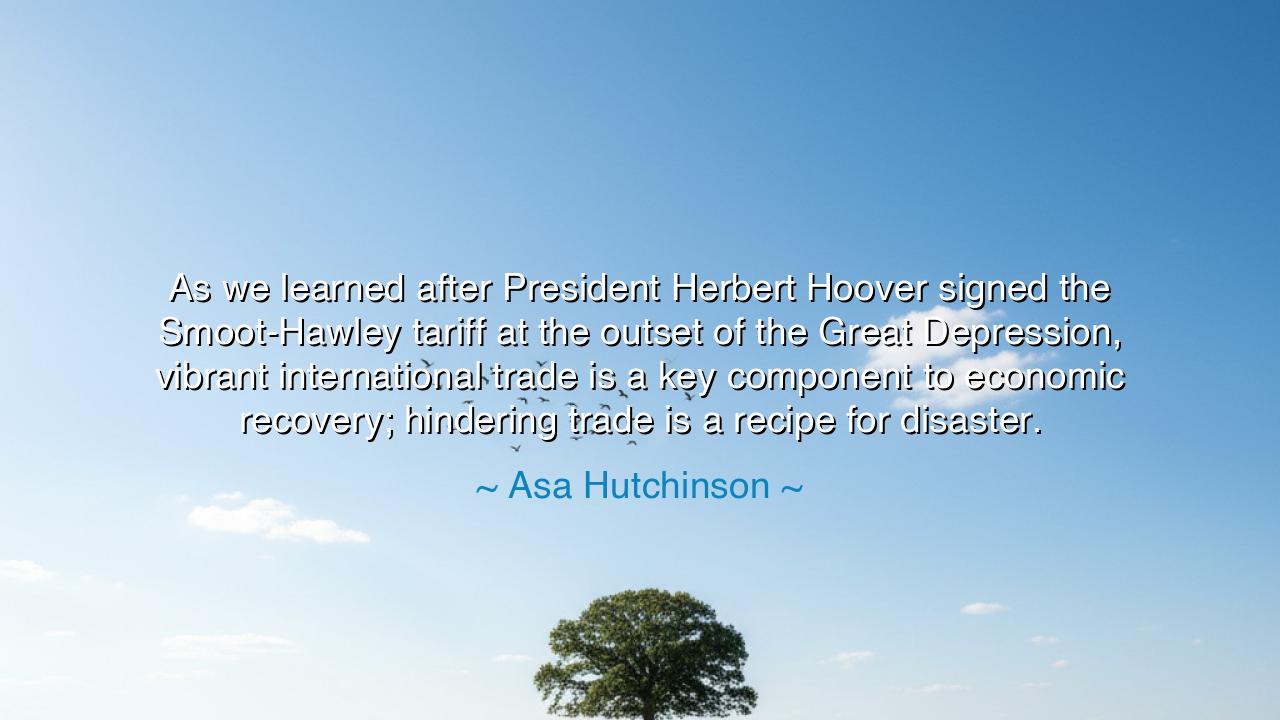
As we learned after President Herbert Hoover signed the
As we learned after President Herbert Hoover signed the Smoot-Hawley tariff at the outset of the Great Depression, vibrant international trade is a key component to economic recovery; hindering trade is a recipe for disaster.






“As we learned after President Herbert Hoover signed the Smoot-Hawley tariff at the outset of the Great Depression, vibrant international trade is a key component to economic recovery; hindering trade is a recipe for disaster.” Thus spoke Asa Hutchinson, reminding the modern world of an ancient truth — that the wealth of nations, like the beating of the heart, depends upon the rhythm of exchange. His words echo across time like a warning bell, calling upon us to remember that when a people withdraw into themselves, when they wall their markets and silence the flow of goods, they choke not only commerce but the spirit of cooperation that sustains civilization.
In the year 1930, as the shadows of the Great Depression spread across the world, President Herbert Hoover signed into law the Smoot-Hawley Tariff Act, a measure meant to protect American farmers and workers by raising taxes on foreign imports. Yet what began as a shield became a spear — wounding the very body it sought to defend. Other nations struck back with their own tariffs, walls rose where bridges once stood, and global trade collapsed. Factories fell silent, crops rotted unsold, and millions lost their livelihoods. It was a time of despair, not born of war or pestilence, but of pride — the pride that blinds men into thinking that prosperity can be hoarded rather than shared.
The lesson of Smoot-Hawley is carved into the tablets of history: isolation breeds ruin. Trade, like the blood in the body, must circulate or decay sets in. No nation is an island; no people thrive alone. From the earliest days of the Silk Road, when merchants carried silk and spices across continents, to the modern age of digital commerce, it has ever been so — that exchange is life. It is through the meeting of hands, the mingling of ideas, and the crossing of borders that humanity has risen from its primal state to the heights of civilization. To hinder that flow is to turn back the clock, to shut the gates of progress and invite hunger to return.
Think of the Marshall Plan after the Second World War. Europe lay in ruins, its cities bombed to rubble, its economies shattered. Yet instead of sealing its borders, America opened its hand. Through trade, aid, and partnership, nations once enemies became allies. Factories roared back to life, ships sailed once more, and out of ashes rose a new age of prosperity. This was the wisdom born from the pain of earlier generations — that recovery is not achieved by isolation, but by interdependence, by the courage to trust in the strength of others as well as one’s own.
When Hutchinson warns that hindering trade is a recipe for disaster, he does not speak only of economics, but of the moral fabric of nations. Trade is not merely the exchange of goods — it is the exchange of goodwill. It is how cultures learn to understand one another, how enmity gives way to cooperation. When we close ourselves off, fear grows where friendship might have bloomed. The barriers of tariffs become the barriers of the heart, and soon, mistrust replaces commerce, conflict replaces dialogue. Thus, the tariff that begins as a line upon paper may end as a scar upon the soul of the world.
Yet the wisdom of this truth extends beyond nations. For even in the lives of men and women, openness is the path to growth. When we hoard our knowledge, our talents, our affections, we stagnate. When we share — when we engage, trade ideas, and offer our gifts to others — we multiply abundance. Just as trade strengthens economies, generosity strengthens spirits. The principle of connection that sustains nations sustains individuals as well. To hinder the exchange of heart and mind is to impoverish oneself.
Therefore, let this teaching be inscribed upon your heart: prosperity is born of openness, ruin of fear. As a farmer must trust the rains, so must nations trust in the cycles of exchange. Build bridges, not barriers. Welcome trade, not only in goods, but in friendship, wisdom, and compassion. For the greatness of a people is measured not by what they keep, but by what they give and receive in harmony with others.
And so, my children, remember the tale of Smoot-Hawley, and let it serve as both warning and guide. Whenever the temptation arises to close your gates, whether in commerce or in spirit, recall that the pulse of life is movement, connection, and trust. For when trade — between nations or between hearts — ceases to flow, decline begins. But when it flows freely, the world becomes as it was meant to be: a web of shared prosperity, woven by the hands of all humankind.






AAdministratorAdministrator
Welcome, honored guests. Please leave a comment, we will respond soon